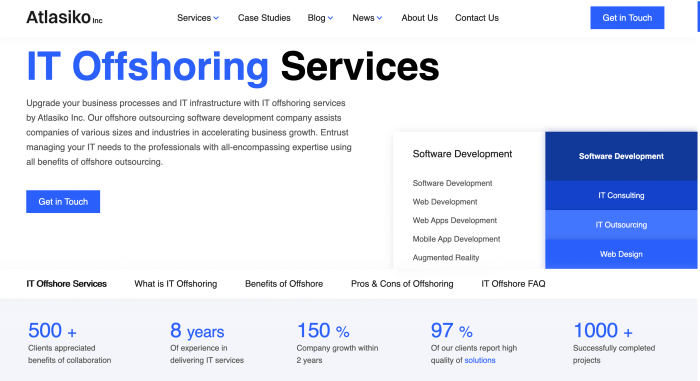In today’s globally interconnected world, businesses are increasingly leveraging the benefits of outsourcing to enhance efficiency and reduce costs. Among the various outsourcing options, offshore software development firms have emerged as a prominent choice for companies seeking skilled developers at competitive rates. This comprehensive guide delves into the intricacies of offshore software development, exploring its advantages, disadvantages, selection criteria, and best practices.
We will also cover crucial aspects like communication strategies, risk mitigation, and legal considerations.

Source: reverbico.com
Understanding Offshore Software Development
Offshore software development involves contracting a software development company located in a different country to handle all or part of a project. This contrasts with nearshore development (outsourcing to a nearby country) and onshore development (using a domestic company). The primary driver for choosing an offshore model is often cost savings, but it also opens doors to access a wider talent pool with specialized skills.
Key Benefits of Using Offshore Software Development Firms
- Reduced Costs: Labor costs in many offshore locations are significantly lower than in developed countries, leading to substantial savings on development expenses. This includes salaries, benefits, and overhead.
- Access to Specialized Skills: Offshore firms often possess expertise in niche technologies and programming languages that might be scarce domestically. This allows businesses to access a wider range of talent.
- Faster Time-to-Market: Many offshore firms operate in time zones that allow for around-the-clock development, potentially accelerating project timelines.
- Increased Scalability: Offshore firms can easily scale their teams up or down depending on project needs, providing flexibility for businesses with fluctuating demands.
- Focus on Core Business: Outsourcing software development frees up internal resources, allowing businesses to concentrate on their core competencies and strategic initiatives.
Challenges of Working with Offshore Software Development Firms
- Communication Barriers: Language differences and cultural nuances can sometimes create communication challenges, potentially leading to misunderstandings and delays.
- Time Zone Differences: Significant time zone differences can make real-time communication and collaboration difficult.
- Quality Control: Ensuring the quality of the delivered software requires robust quality assurance processes and effective communication.
- Security Concerns: Protecting intellectual property and sensitive data requires careful consideration of security protocols and contractual agreements.
- Legal and Regulatory Compliance: Navigating different legal and regulatory frameworks in multiple countries can be complex.
Choosing the Right Offshore Software Development Firm
Selecting the right offshore partner is crucial for project success. Consider these factors:
Key Selection Criteria
- Experience and Expertise: Review the firm’s portfolio, client testimonials, and experience in relevant technologies.
- Development Process: Assess their software development methodology (Agile, Waterfall, etc.) and its suitability for your project.
- Communication and Collaboration Tools: Determine how they facilitate communication and collaboration across geographical boundaries.
- Team Composition and Skills: Ensure the firm has the necessary skills and experience to handle your specific project requirements.
- Security and Data Protection: Verify their security measures and compliance with relevant data protection regulations.
- Pricing and Contractual Terms: Clearly define the scope of work, payment terms, and intellectual property rights.
- Client References: Reach out to previous clients to gather feedback on their experience.
Managing Offshore Software Development Projects
Effective project management is essential for successful offshore software development. This involves establishing clear communication channels, setting realistic expectations, and implementing robust quality control measures.
Effective Communication Strategies
- Regular Communication: Schedule regular meetings, video conferences, and progress reports to maintain transparency and address issues promptly.
- Project Management Tools: Utilize project management software (e.g., Jira, Asana) to track progress, manage tasks, and facilitate collaboration.
- Clear Documentation: Maintain comprehensive documentation of requirements, specifications, and design decisions.
- Language and Cultural Sensitivity: Be mindful of language barriers and cultural differences when communicating with the offshore team.
Risk Mitigation and Best Practices
- Detailed Contracts: Establish a comprehensive contract that clearly Artikels the scope of work, payment terms, intellectual property rights, and dispute resolution mechanisms.
- Regular Quality Assurance: Implement rigorous quality assurance processes to ensure the software meets the required standards.
- Version Control: Use version control systems (e.g., Git) to track changes and manage code efficiently.
- Security Protocols: Implement robust security measures to protect sensitive data and intellectual property.
- Contingency Planning: Develop a plan to address potential risks and challenges, such as delays, communication breakdowns, or technical issues.
Legal and Regulatory Considerations
Working with offshore software development firms involves navigating different legal and regulatory environments. Understanding these aspects is crucial to avoid potential legal issues.
Key Legal Aspects
- Data Privacy: Ensure compliance with data privacy regulations in both your country and the offshore location.
- Intellectual Property Rights: Clearly define ownership of intellectual property rights in the contract.
- Contract Law: Choose the appropriate governing law for the contract, considering the location of the offshore firm and your business.
- Tax Implications: Understand the tax implications of working with an offshore firm.
Frequently Asked Questions (FAQ)
- Q: How much does offshore software development cost? A: The cost varies greatly depending on factors like location, developer expertise, project complexity, and contract terms. It’s generally significantly lower than onshore development.
- Q: What are the best countries for offshore software development? A: Popular destinations include India, Ukraine, the Philippines, Eastern Europe, and parts of Latin America, each offering unique strengths and specializations.
- Q: How can I ensure the quality of the software developed offshore? A: Implement rigorous quality assurance processes, including code reviews, testing, and regular communication with the development team.
- Q: What are the risks of using offshore software development firms? A: Potential risks include communication barriers, time zone differences, quality control issues, security concerns, and legal complexities.
- Q: How do I choose the right offshore software development firm? A: Carefully evaluate the firm’s experience, expertise, development process, communication capabilities, security measures, and client references.
Conclusion
Offshore software development offers significant advantages for businesses seeking cost-effective and efficient solutions. However, it’s crucial to carefully assess the risks and challenges involved and select a reputable firm with a proven track record. By implementing robust project management strategies and addressing potential issues proactively, businesses can successfully leverage the benefits of offshore development to achieve their software development goals.
References: Offshore Software Development Firm
While specific links to reputable sources are beyond the scope of this text-based response, relevant research can be found through searches on reputable sites such as Gartner, Forrester, and industry-specific publications focusing on software development and outsourcing.
Call to Action
Ready to explore the possibilities of offshore software development? Contact us today for a free consultation and let us help you find the perfect partner to bring your software vision to life.
FAQ Summary
What are the common legal considerations when working with an offshore software development firm?
Legal considerations include intellectual property rights, data privacy regulations (GDPR, CCPA etc.), contract terms specifying ownership and liability, and dispute resolution mechanisms.
How can I ensure effective communication with an offshore team?
Establish clear communication channels (e.g., project management software, regular video calls), define roles and responsibilities, and utilize translation services if needed. Regular progress updates are key.
What are the typical payment models for offshore software development?
Common models include fixed-price contracts (for clearly defined projects), time and materials contracts (for more flexible projects), and dedicated team models (for ongoing support).

Source: balimechanicweb.net
How do I assess the quality of an offshore software development firm?
Review their portfolio, client testimonials, and technical expertise. Check for relevant certifications and industry recognition. Conduct thorough due diligence and potentially request a trial project.
